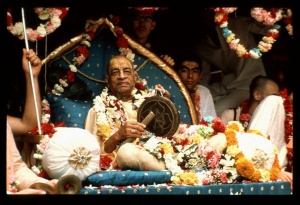SB 7.12.8: Difference between revisions
No edit summary |
(Vanibot #0054 edit - transform synonyms into clickable links, which search similar occurrences) |
||
| Line 23: | Line 23: | ||
<div class="synonyms"> | <div class="synonyms"> | ||
''keśa-prasādhana'' | ''[//vanipedia.org/wiki/Special:VaniSearch?s=keśa&tab=syno_o&ds=1 keśa]-[//vanipedia.org/wiki/Special:VaniSearch?s=prasādhana&tab=syno_o&ds=1 prasādhana]'' — brushing the hair; ''[//vanipedia.org/wiki/Special:VaniSearch?s=unmarda&tab=syno_o&ds=1 unmarda]'' — massaging the body; ''[//vanipedia.org/wiki/Special:VaniSearch?s=snapana&tab=syno_o&ds=1 snapana]'' — bathing; ''[//vanipedia.org/wiki/Special:VaniSearch?s=abhyañjana&tab=syno_o&ds=1 abhyañjana]-[//vanipedia.org/wiki/Special:VaniSearch?s=ādikam&tab=syno_o&ds=1 ādikam]'' — massaging the body with oil and so on; ''[//vanipedia.org/wiki/Special:VaniSearch?s=guru&tab=syno_o&ds=1 guru]-[//vanipedia.org/wiki/Special:VaniSearch?s=strībhiḥ&tab=syno_o&ds=1 strībhiḥ]'' — by the wife of the spiritual master; ''[//vanipedia.org/wiki/Special:VaniSearch?s=yuvatibhiḥ&tab=syno_o&ds=1 yuvatibhiḥ]'' — very young; ''[//vanipedia.org/wiki/Special:VaniSearch?s=kārayet&tab=syno_o&ds=1 kārayet]'' — should allow to do; ''[//vanipedia.org/wiki/Special:VaniSearch?s=na&tab=syno_o&ds=1 na]'' — never; ''[//vanipedia.org/wiki/Special:VaniSearch?s=ātmanaḥ&tab=syno_o&ds=1 ātmanaḥ]'' — for personal service; ''[//vanipedia.org/wiki/Special:VaniSearch?s=yuvā&tab=syno_o&ds=1 yuvā]'' — if the student is a young man. | ||
</div> | </div> | ||
Latest revision as of 22:53, 18 February 2024

A.C. Bhaktivedanta Swami Prabhupada
TEXT 8
- keśa-prasādhanonmarda-
- snapanābhyañjanādikam
- guru-strībhir yuvatibhiḥ
- kārayen nātmano yuvā
SYNONYMS
keśa-prasādhana — brushing the hair; unmarda — massaging the body; snapana — bathing; abhyañjana-ādikam — massaging the body with oil and so on; guru-strībhiḥ — by the wife of the spiritual master; yuvatibhiḥ — very young; kārayet — should allow to do; na — never; ātmanaḥ — for personal service; yuvā — if the student is a young man.
TRANSLATION
If the wife of the spiritual master is young, a young brahmacārī should not allow her to care for his hair, massage his body with oil, or bathe him with affection like a mother.
PURPORT
The relationship between the student or disciple and the wife of the spiritual master or teacher is like that between son and mother. A mother sometimes cares for her son by combing his hair, massaging his body with oil, or bathing him. Similarly, the wife of the teacher is also a mother (guru-patnī), and therefore she may also care for the disciple in a motherly way. If the wife of the teacher is a young woman, however, a young brahmacārī should not allow such a mother to touch him. This is strictly prohibited. There are seven kinds of mothers:
- ātma-mātā guroḥ patnī
- brāhmaṇī rāja-patnikā
- dhenur dhātrī tathā pṛthvī
- saptaitā mātaraḥ smṛtāḥ
These mothers are the original mother, the wife of the teacher or spiritual master, the wife of a brāhmaṇa, the king's wife, the cow, the nurse and the earth. Unnecessary association with women, even with one's mother, sister or daughter, is strictly prohibited. This is human civilization. A civilization that allows men to mix unrestrictedly with women is an animal civilization. In Kali-yuga, people are extremely liberal, but mixing with women and talking with them as equals actually constitutes an uncivilized way of life.